Run a marathon during chemotherapy? One UChicago Medicine breast cancer patient did.
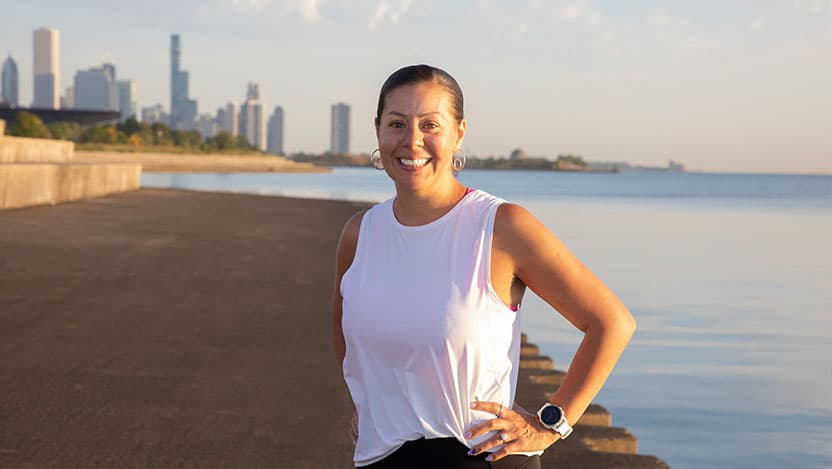
Her husband was against it and her doctors at the University of Chicago Medicine were skeptical.
But Fabiola “Faby” Enriquez was determined to run the New York City Marathon after finishing the first two weeks of her 20-week chemotherapy for aggressive stage 2 breast cancer.
Enriquez, a lifelong athlete who was 40 at the time, told her UChicago Medicine oncologist, Philip C. Hoffman, MD, that she didn’t want breast cancer to stop her from participating in the marathon. She’d won a lottery to get an entry to the prestigious race.
“Dr. Hoffman told me, ‘Well, you can run the marathon, but you can’t run the marathon,’” she recalled, laughing at his roundabout way of saying that chemotherapy would zap her energy and her ability to run the 26.2-mile race.
UChicago Medicine’s oncologists encourage their patients to stay active during cancer treatment. If they want to swim or work out every day, they should, Hoffman said. However, chemotherapy causes extreme fatigue and lowers a person’s immunity and white blood cell count, making them susceptible to infections.
Running a marathon can cause dehydration, electrolyte imbalance or muscle injuries, adding to Enriquez’s challenges. But since Enriquez was an experienced marathoner, Hoffman was confident she would take extra precautions. There was also a risk of getting a cut, and the cut getting infected, but Hoffman felt the chances of this happening were low. He gave Enriquez his blessing.
“There’s no reason a person should be sitting home in a bubble, but the average person isn’t running marathons,” said Hoffman, now semi-retired and a clinical professor of medicine. “My thought was, if she wants to do it, fine. If she has the strength and energy, obviously this is important to her. She’s not seriously jeopardizing her health in any way to do so.”
The first week of chemotherapy hit Enriquez hard. Her famously long hair started to fall out. Most days, she was too weak to get out of bed.
“I thought, ‘The doctors were right. There’s no way I can run the marathon,’” she said. “Then about 8 days in, I started to feel a bit more normal. I went for a run and decided I could do it.”
Enriquez cut her hair shoulder-length for the race. Days later, she’d shave it all off — a tearful experience done by a stylist who is a breast cancer survivor. Many of Enriquez’s family and friends, including her mother, daughter and husband, shaved their heads as a show of support.
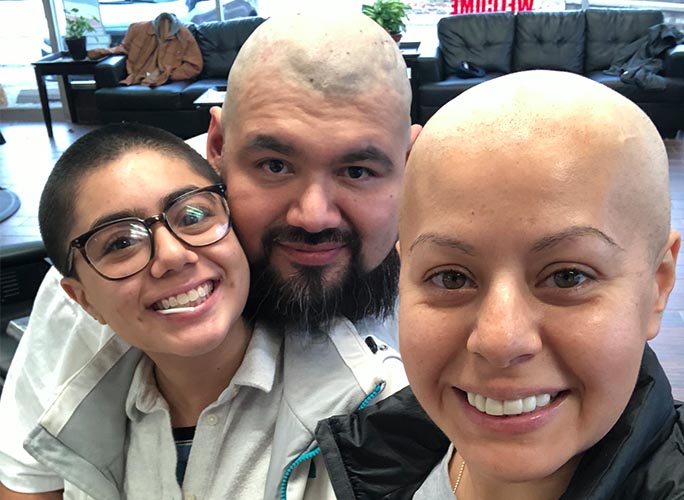
“The hardest part of my whole journey was losing my hair. That made everything a lot more real. Having to see myself in the mirror every day bald was really hard, but I got a lot of compliments on my perfectly round head,” she said.
The Hinsdale mother of three completed the 2018 New York City Marathon in under 5 hours. During the race, Enriquez soaked it all in — smiling, high-fiving spectators and even crying at times. She wore a pink tutu, a pink breast cancer awareness shirt, and a Mexican flag draped on her shoulders as a cape, a nod to her family’s heritage. When she returned home, she resumed her chemotherapy for the next 4 ½ months.
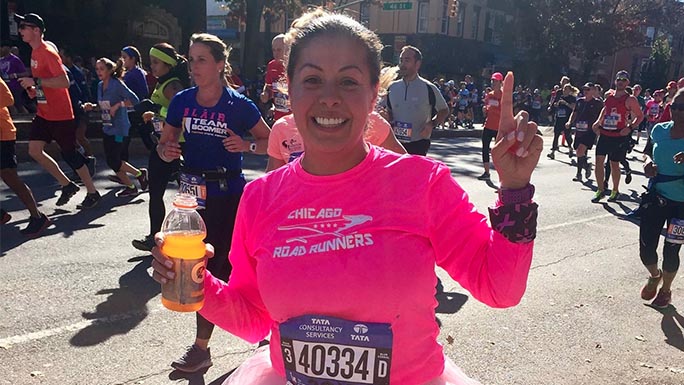
Breast cancer runs in Enriquez’s family so she was diligent about regular mammograms and breast self-exams. During a self-exam in September 2018, she detected what felt like a small, hard pellet in one of her breasts. A biopsy confirmed it was breast cancer.
“The doctor said, ‘We’re a little concerned that there’s something in your lymph nodes, but we’re just going to monitor it.’ I thought, ‘You’re just going to monitor it?’ That didn’t sit well with me. So, I went and got a second opinion,” Enriquez said.
At UChicago Medicine’s Comprehensive Cancer Center, Enriquez met with surgeon Nora Jaskowiak, MD. She confirmed Enriquez had a high-grade, 1.5-centimeter (the size of a large grape), estrogen receptor-positive, cancerous tumor in her breast. Enriquez purposely didn’t mention anything about her lymph nodes, wanting to see if Jaskowiak would notice.
“Within seconds, Dr. J. said, ‘I feel something in your lymph nodes. Do you have time for an ultrasound?’ She did the ultrasound and biopsy right there on the spot and, sure enough, it was cancer,” Enriquez said. “That’s when I decided I’m going to UChicago Medicine for treatment.”
Her breast cancer treatment plan would involve 20 weeks (four cycles) of neo-adjuvant chemotherapy, followed by a lumpectomy. The surgery included targeted removal of certain lymph nodes and breast reconstruction, preventing her from needing a second surgery. After that, she had six weeks of radiation on her breast and lymph nodes.
“After the first few weeks of chemotherapy, the tumors in her breast and lymph nodes just disappeared. These types of tumors that grow really fast are super-sensitive to chemo, so they die really fast, also,” Jaskowiak said.
My doctors were amazing. They worked with me every step of the way and were so supportive. No one wants to go through this experience, but I can honestly say I had the most positive experience at UChicago Medicine from the moment I was diagnosed.
While Enriquez could have had her treatments closer to home, she opted to make the hour-long trek to UChicago Medicine in Hyde Park because she liked and felt comfortable with the team there.
“My doctors were amazing. They worked with me every step of the way and were so supportive. No one wants to go through this experience, but I can honestly say I had the most positive experience at UChicago Medicine from the moment I was diagnosed. I had good insurance and good doctors,” she said.
Enriquez was unable to exercise, bounce, jump, or overuse her arms for a few weeks after surgery. Her surgery wounds needed to heal before she started radiation. As soon as she was able, she began running again.
In September 2019, two months after she rang the bell to signal the end of her cancer treatment (a ceremonial event done by patients to celebrate), Enriquez ran the Berlin Marathon in Germany. She’s done several other athletic competitions since then, including an Iron Man in 2021. She is running the New York City Marathon again in November, although she says it will be hard to top the euphoria of running the race during the start of her treatment.
Today, Enriquez, 44, is more than three years cancer-free. She works as a part-time teachers’ aide at a Montessori school and cares for her 8-year-old son. She also has two adult daughters, ages 25 and 21.
Looking back, she believes it all happened for a reason.
“My joke is that, since the Berlin and New York marathons are so hard to get into, God was like, ‘I’m going to give you breast cancer but you’re going to run two of the world’s major marathons.’ And that’s honestly what kept me going,” she said. “Running has always been my savior.”
Post-cancer, many people get paralyzed by anxiety that the cancer will return. Not Enriquez.
“One of the great things about Faby was that she went full speed ahead. She just has such an awesome attitude and that helped her get through it. She’s doing all her appropriate follow-up and living her life,” Jaskowiak said. “You can’t escape the effects of chemotherapy, surgery and radiation, but you can still thrive.”
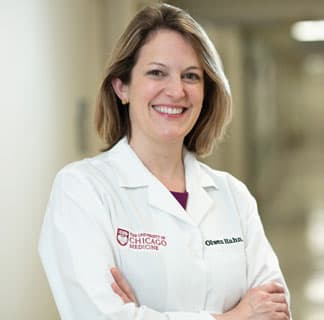
Breast Cancer Care
Our team represents expertise across the spectrum of breast cancer care: breast imaging, breast surgery, medical and radiation oncology, plastic and reconstructive surgery, lymphedema treatment, clinical genetics, pathology and nursing. Our comprehensive care approach optimizes chances of survival and quality of life.
Learn more about UChicago Medicine breast cancer care.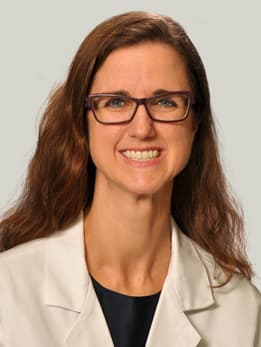
Nora Jaskowiak, MD
Nora Jaskowiak, MD, is an expert in breast surgery and breast cancer, and also specializes in the surgical management of endocrine disorders, including thyroid cancer and parathyroid conditions. She serves as surgical director of UChicago Medicine's Breast Center.
View Dr. Jaskowiak's physician profile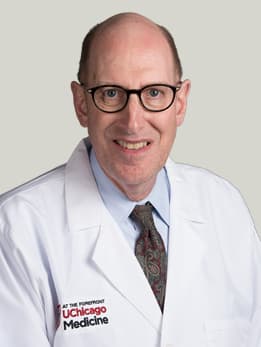
Philip C. Hoffman, MD
Philip C. Hoffman, MD, is an expert in cancers of the lung, breast and esophagus. He sees patients with all stages of these cancers.
View Dr. Hoffman's physician profile